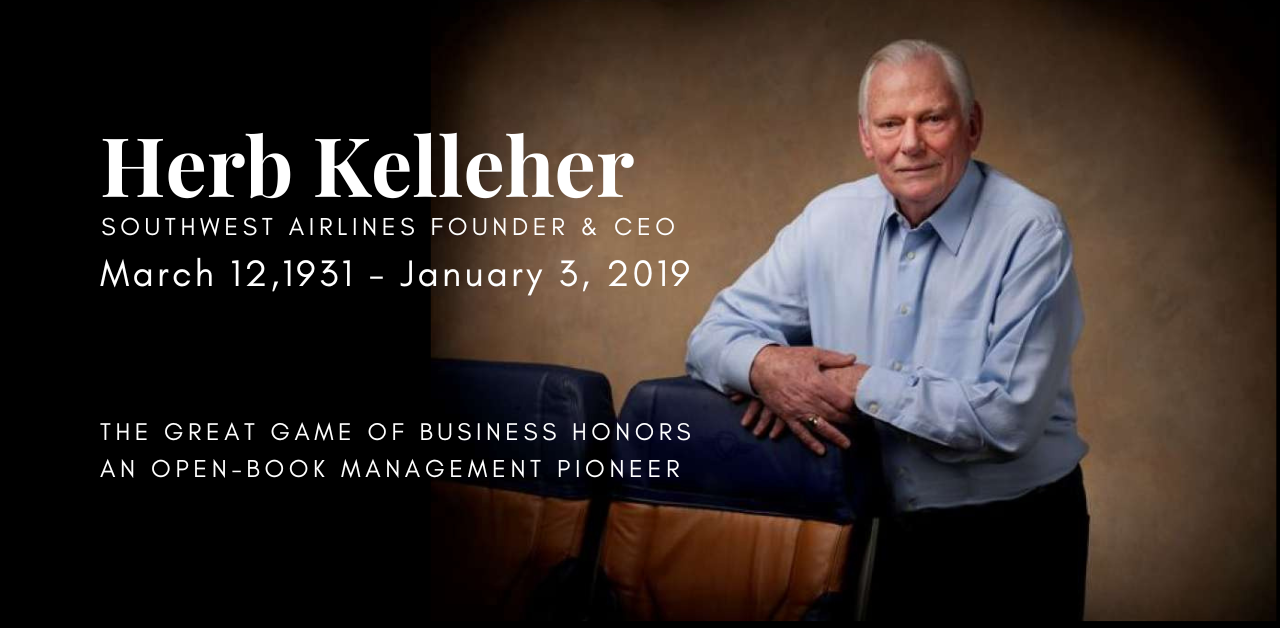 I was saddened to hear about the loss of Herb Kelleher, the founder of Southwest Airlines. I’ll never forget the time back in the early 1990s when I was invited to Texas to talk about the Great Game of Business with Herb and his team at Southwest. After I gave my talk, I figured everything I had shared about our open-book story wasn’t worth much given how big Southwest was and how many locations they operated out of. I wasn’t sure our Great Game system would work in a big company.
I was saddened to hear about the loss of Herb Kelleher, the founder of Southwest Airlines. I’ll never forget the time back in the early 1990s when I was invited to Texas to talk about the Great Game of Business with Herb and his team at Southwest. After I gave my talk, I figured everything I had shared about our open-book story wasn’t worth much given how big Southwest was and how many locations they operated out of. I wasn’t sure our Great Game system would work in a big company.
Then Herb stood up. He took over the podium and told his leaders that there were only five things that could take out their company: their five unions. I admit I was shocked because I didn’t know they were a union company. But Herb then told his team that the only way their airline was going to make it was if they could teach everyone, all ninety thousand people—including every union employee—how the company made money and generated cash.
Just a few months later, there was a front-page story talking about how Southwest Airlines and one of their unions had struck an unprecedented ten-year deal that included no wage increases in exchange for equity shares and profit sharing. By teaching people the business, Herb got them to understand the real wealth building opportunity was in stock options and profit sharing—not chasing higher wages.
Well, that story continues today. Every year, Southwest announces how much of its annual profits it shares with its thousands of employees—which works out to about an average of a more than 10 percent bonus for each employee—a practice that has continued for forty-five years and counting. Imagine that: an airline that’s been profitable for forty-five years. The amazing thing is that they credit the Great Game for helping them utilize the power of teaching every employee to watch the numbers—and how to have fun doing it.
Ann Rhoades, an early employee of Southwest and one of the founders of Jet Blue, has spoken at our annual conference, the Gathering of Games. Several times, she has talked about how the high-performance cultures of both airlines have been built on those principles—what they called “The Big Game.” She even tells a story about how she once had to lay someone off at Southwest. When Ann got the call from the union steward, he told her he was going to grieve the decision—but he also said she would win. He trusted her decisions because they were all using the same scoreboard; they were on the same team.
I guess we can say that Southwest has validated sharing a Stake In The Outcome can work in a union shop as well as in a big public company, right? Doesn’t it make you wonder whether the critics have anything left to hold onto when someone asks: Why isn’t every business run this way?
Of course, Herb Kelleher spent his entire life proving the critics wrong.
.png)



.jpg)




.png)




-5.png)

